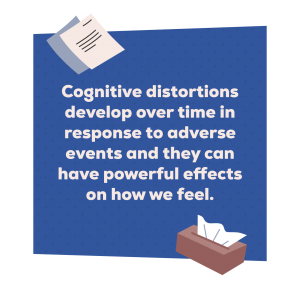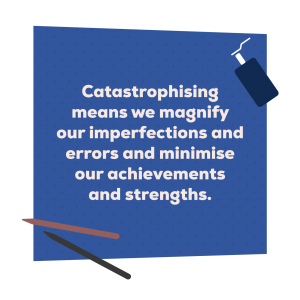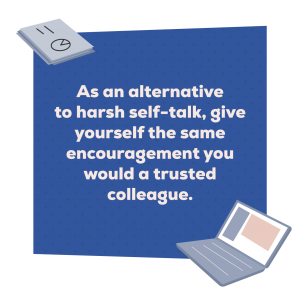How can we make our thinking patterns work for us rather than against us in times of uncertainty?
Sam’s been working from home for six months.
While others in her organisation have been returning to the office, Sam and her team have been working remotely at the dining table, in the spare room or wherever they can find a suitable space. And it looks set to stay that way with uncertainty around expectations and working patterns.
Although Sam’s seen some benefits, lunchtime dog walks with Buster being a highlight, it’s been a rough ride at times, with the kids at home, the laptop permanently open, dodgy Wifi signal, and the work / life balance being questioned. Virtual meetings between those in the office and colleagues at home have become the norm and the emails are relentless.
Sam’s been experiencing some frustrating thoughts that have been getting her down:
 I should work weekends, like everyone else does!
I should work weekends, like everyone else does!
If I can’t make this presentation perfect I’ve failed!
This is the worst report I’ve ever written!
Today was a total disaster!
I’m always messing up!
Sam is not alone.
Statements like these are common and can be the result of ‘cognitive distortions’, also known as unhelpful thinking styles, which can develop over time in response to adverse events. In the 1960s, psychiatrist Aaron Beck pioneered research on cognitive distortions in his development of cognitive behavioural therapy (CBT), to improve mental health and emotional regulation.
Our brains interpret the world around us, trying to make sense of events. Sometimes we see things accurately, but often our minds take ‘short cuts’ and our thinking becomes biased. These biases can have damaging effects on how we feel and how we interact with others. They are also very normal and very human and by talking about them more of the time, we can gradually help to challenge and ease them, making life and work a little easier to manage.
“Change your thoughts and you change your world.” | Norman Vincent Peale
Unhelpful thinking patterns can become heightened through hybrid working
We can all fall into the trap of unhelpful thinking, particularly at times of busyness, worry and uncertainty. And in our new world of hybrid working, these thinking patterns can be heightened because we sometimes lack the comfort, clarity and reassurance of our familiar working environments. Take Sam. Her team has been physically split apart, many of the communication channels she knows and trusts are no longer readily available, and the personal connections she relies on every day have felt like a world away.
With the next six months looking just as unsettled as the last, it could be really helpful to develop a greater awareness of these thinking patterns and understand ways we can catch them when they start to creep in…
Common unhelpful thinking patterns
Since cognitive distortions were first considered by Beck, researchers have identified common unhelpful thinking patterns:
- All-or-nothing thinking – thinking in black-or-white extremes without a middle ground, for example, something is either a success or a failure.
- Overgeneralisation – seeing a pattern based on too little data. We hear ourselves saying, ‘this happens every time’ or ‘this always happens’.
- Disqualifying the positive – dismissing information, writing off positive events as a fluke or thinking they don’t count. Like those times when we’ve asked for feedback and we focus on that one comment we can’t shift away from, even though all the other themes are positive.
- Jumping to conclusions – jumping to negative conclusions that aren’t justified by fact. ‘Fortune telling’ means we predict bad things will happen. ‘Mind reading’ means we assume other people are thinking negatively about us. We find ourselves saying things like, ‘I know what’s going to happen’ or ‘I know what they’re thinking.’
 Magnification and minimisation – how we catastrophise about imperfections and errors while minimising achievements and strengths… ‘If I don’t do a good job, they’ll let me go.’
Magnification and minimisation – how we catastrophise about imperfections and errors while minimising achievements and strengths… ‘If I don’t do a good job, they’ll let me go.’- ‘Should’ statements – reflect our (often unreasonable) standards (‘I should do this’, ‘I must do that’) and can lead to feelings of frustration, shame, or guilt. ‘I should work longer hours’ or ‘I should join that meeting at 5pm.’
Managing the impact of unhelpful thinking patterns
Here are some tips to help control our thinking when cognitive distortions begin to test us:
See a different colour – instead of thinking in black or white, win or lose, succeed or fail, try thinking in shades of grey by evaluating things on a scale of 0 to 100. When a task hasn’t gone quite to plan, think about the experience as a partial success and plot it on a scale instead. 42 out of 100 is a lot better than total failure!
 Drop the double standards – an alternative to harsh ‘self-talk’ is to speak to ourselves in the same caring way that we would with a colleague in a similar situation. We’re unlikely to find ourselves saying, ‘That’s the worst report you’ve ever written!’ Instead of treating yourself with a different standard to everyone else, why not use one single standard for everyone? Give yourself the same encouragement you would a trusted colleague.
Drop the double standards – an alternative to harsh ‘self-talk’ is to speak to ourselves in the same caring way that we would with a colleague in a similar situation. We’re unlikely to find ourselves saying, ‘That’s the worst report you’ve ever written!’ Instead of treating yourself with a different standard to everyone else, why not use one single standard for everyone? Give yourself the same encouragement you would a trusted colleague.
Watch your language – should statements like ‘I should do this’ or ‘I shouldn’t do that’ can imply unhelpful judgment on ourselves. Every time you find yourself using a should statement, try substituting, ‘It would be nice if…’ instead. This subtle difference can work wonders in your own mind, as you stop ‘should-ing’ yourself to death and start looking at the world in a more positive way.
Phone a friend – we’re all in the same boat, aren’t we? So pick up the phone and chat through your thoughts. Check in with a trusted colleague to see what their opinions and experiences are and enjoy the added benefit of boosting team spirit and investing in positive relationships at the same time.
Be kind to yourself – showing yourself compassion might sound simple but it’s not always easy. Making a genuine effort each day to build yourself up is a wonderful habit to get into. Sam doesn’t have it easy; she’s learning a whole new way of working and so are we. Be a little more gentle and a little less hard on yourself, think about the things you’re proud of and the good stuff you’ve achieved, even the small wins matter.
What tips can you add to challenge unhelpful thinking patterns?
















